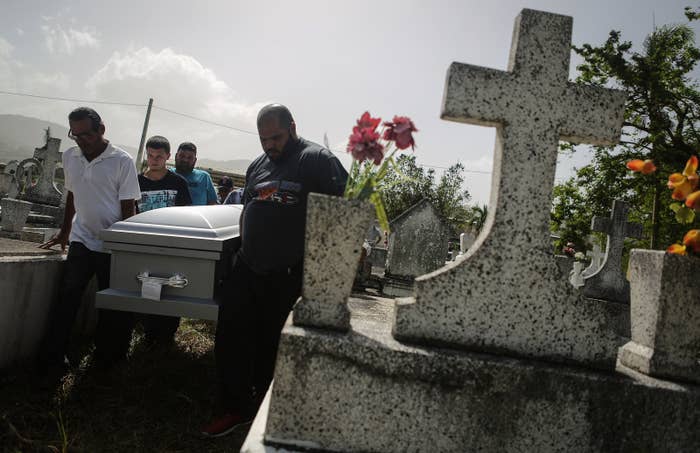
The Puerto Rican government announced Thursday that there will be an independent study of the death toll in the aftermath of Hurricane Maria, four months after their official count was called into question by reports from funeral homes, crematoriums, and medical facilities.
George Washington University's Milken School of Public Health will lead the study, Gov. Ricardo Rosselló announced during a press conference.
The school will produce a peer-reviewed report in a year, said Milken Dean Lynn Goldman, and will include an analysis of the Puerto Rican government's methods in the months after the storm, a revised death toll, and recommendations for best practices in future natural disasters.
Rosselló said he expects the toll to increase, but could not estimate by how much.
"How much will that increase? That’s why we have the experts working on it. It would be irresponsible on my part to speculate," Rosselló said during the press conference.
The official death toll, last updated Dec. 4, stands at 64.
However, reporting by BuzzFeed News and later by other outlets found hundreds of other cases that were not included in the toll.
Earlier this month, the Puerto Rican Center for Investigative Journalism sued the island's Demographic Registry for failing to provide statistical updates on the death toll.
The Institute of Forensic Sciences, tasked with certifying hurricane-related deaths, allowed 911 bodies to be cremated without examination in the first five weeks after the hurricane. Crematorium directors told BuzzFeed News at least dozens of those were hurricane-related cases.
The governor initially ordered an investigation of the death toll in December to be headed by Public Safety Secretary Héctor Pesquera, the same person who was in charge of the death toll and defended its accuracy even as reporters provided mounting evidence of its flaws in the months after the storm.
Pesquera will assist the researchers in the "integration and collaborative work among the entities and agencies involved," he said in a press release Thursday.
Rosselló said the government has "recognized from day one that it was the sort of limited protocol that we had from the CDC regarding death certificates, establishing what was the cause of death, and so forth."
The Department of Public Safety told BuzzFeed News in October that they were not using any specific guidelines for deciding what was and what was not counted as a hurricane-related death, but defended their procedures.
Asked about that lack of clear protocol in November, Rosselló told BuzzFeed News, “Okay, that is not the case. There is a clear criteria.” He added that officials had “been working on that and has been meeting with the hospitals, the crematoriums, forensic centers, and they have already distributed the protocol.”
Goldman said that in the "second phase" of the study announced Thursday, experts will examine death certificates and could reexamine the "cause of death" determination in cases where researchers decide it's not clear whether they were hurricane related or not. She did not go into details about what criteria will be used to decide if a case should be reexamined, but said, "We identify hot leads and those are the ones that we will want to pursue."
"We consider this part of the job to identify each and every death," she said. "That involves being very creative, looking not just [at] certificates of death, but also at all of the places, hospitals, clinics, funeral homes, where we can find and account for deaths."
Goldman said GWU's director of the Global Health Policy Program, epidemiologist Carlos Santos-Burgoa, will lead the team of epidemiologists, demographers, and communications and data management experts from GWU and the University of Puerto Rico.
The study will also look at the total number of deaths on the island from the day the hurricane made landfall, Sept. 20, to the end of February 2018, and will compare that to the number of deaths over that period in previous years, with the aim of producing a publicly accessible "warehouse of data of all the mortality data."
She said researchers will also take into account "the very complicated changes that have occurred in the population over that time," including the exodus of people from the island to the United States mainland in recent years.
One disaster fatality expert, Robert Jensen of Kenyon International, told BuzzFeed News the announcement could be a step in the right direction but that another year is a long time to expect family members to wait for clarity on how the death of their loved ones are being recorded.
And he said it's crucial that the public is given clear and transparent criteria on how the researchers will count hurricane-related deaths.
"What shouldn't take a year is, the question of what is the criteria. To me, it's pretty straightforward, what is the criteria?" he said.
Kenyon International was contracted by FEMA during Hurricane Katrina to help recover and identify human remains. The company was not contacted by FEMA or the Puerto Rican government to help during or after Hurricane Maria.
The Puerto Rican government will provide $305,000 for the study and also look for grant funding. Goldman said she estimates the second phase of the study, reexamining specific cases, to cost another $1.1 million.
